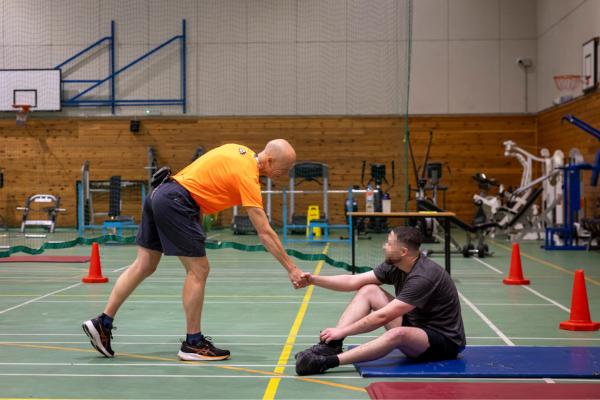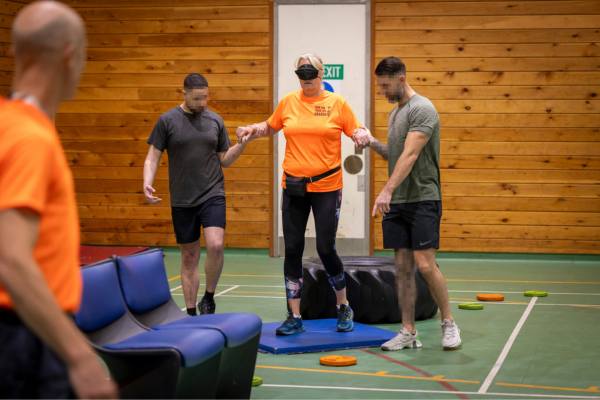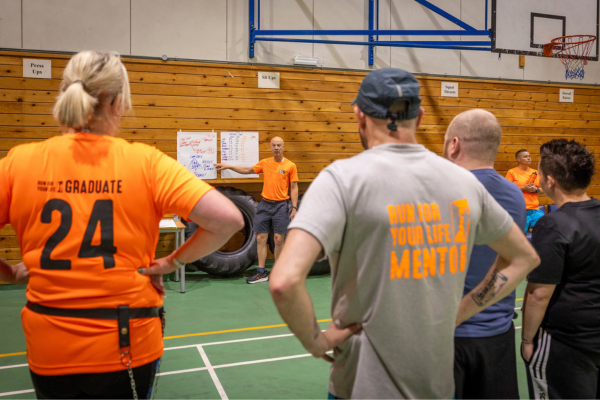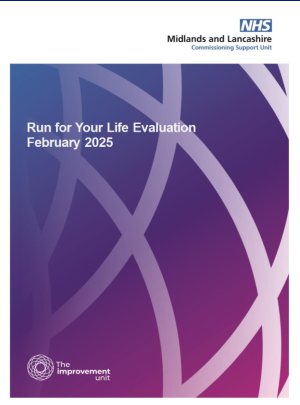Run For Your Life: How Physically-Active Learning (PAL) is adding value ‘both sides of the bars’
This month Alliance of Sport network member, Run For Your Life CIC, will mark the end of its first full year of a groundbreaking reciprocal mentoring project which brings multiple benefits for prisoners, prison staff and to supportive corporate partners.
A not-for-profit Community Interest Company, Run For Your Life (RFYL) is principally a rehabilitation initiative designed to improve the mental, physical and emotional wellbeing of prisoners through Physically-Active Learning (PAL) and endurance-based activities. It was founded by lifelong endurance athlete Andy Mouncey in 2017, and most recently delivered in HMP Manchester and HMP Hindley in North-West England.
RFYL operates “both sides of the bars” so as well as supporting men serving sentences, Andy works alongside staff and their leadership teams. And as an extension of that, this month saw an event held at the London offices of PriceWaterhouseCoopers (PwC) to mark the close of a unique reciprocal mentoring model arranged by Andy between 13 prison leaders and 13 senior partners from PwC.

The event follows an evaluation of the RFYL programme being published recently by the NHSE Midlands and Lancashire Commissioning Support Unit, which can be accessed here.
Andy explains: “I design and deliver my own programmes, and the thread that runs through all of that is the practice and principles of Physically-Active Learning (PAL). In other words, the deliberate and tactical use of physical activity in order to enhance engagement and learning.”
The work at HMP Manchester and HMP Hindley has seen Andy attending the prisons for a few days every month for the last year and a half.
CHALLENGING
“Staff and prisoners participate together over a number of back-to-back, deliberately challenging and intensive days.
“The goal of those is health and safety. And by that I mean we have some clear health-related outcomes, but what we’re also finding are the ‘crown jewels’ of the work; as a contribution to improving the working and living environment on the wings.
“We do this by building relationships so that people have an opportunity to remember that we have more in common than we have differences.”

Andy adds: “Therefore, when things go south as they periodically do in prisons, people are more likely to work in support and co-operation with each other.
“That is the work; it’s essentially to get more men out of cells and more staff out of their silos, to do more for themselves and each other, and thereby contribute to the running of the prison.”
The partnership work with prison leaders and corporate executives also sees Andy oversee midweek residential retreats, which enables them to “recharge, reconnect and rediscover humanity” as well as working collaboratively on common problems in leadership. “We spend a lot of time outside, doing physical stuff,” says Andy, who reveals: “There are very definite learning outcomes.”
ISOLATION
The reciprocal mentoring project with PwC was originally conceived and piloted during the Covid-19 pandemic when Andy worked with nine prison governors “purely online”.
“It was about developing ways to support them at a time of their greatest professional challenge, and probably their biggest personal isolation.
“Now we’re going to bring everybody together, pool the experience and pool the lessons from the year, and use that learning to inform future programme design, and to strengthen the partnership with PwC in this field.

“We’ll also take the opportunity to extend and expand that part of our work. Everything that we’re hearing and experiencing so far Is that we have something that is really quite special that nobody else is doing. It’s actually an experience that, certainly within the prison service, people are crying out for.”
The evaluation from the NHSE Midlands and Lancashire Commissioning Support Unit has helped Andy to ensure that he is not, as he puts it, “marking my own homework”.
But it’s also helping to make the case for Run for Your Life’s unique approach to PAL on both sides of the bars.
AGENCY
“That thing around mind-body connection is real,” says Andy, reflecting on the evaluation. “It is a sure-fire way of managing mood, and understanding that we all have agency over it.
“For men on the inside, they have more agency than they think. For someone who is physically very debilitated, or in advanced years, or confined to a cell – perhaps they have limited physical mobility or limited physical literacy – there is always a way.
“You want them to experience the mind and body connection, and appreciate that they have agency over their emotions and how they feel, and therefore they also have agency over what they can do and how they look. It’s never too late to start this process and for them to experience that. The rest is just getting creative.”
Andy says his work essentially revolves around designing innovative and fit-for-purpose interventions, and he will “always start where we can make the biggest difference in the shortest amount of time”.
“I see possibilities that could be turned into probabilities, it’s very straightforward,” he says. “But what it does require is for people to get off their backsides and be of service, to work and operate for the collective good.”
He adds: “It’s not about being friends. It’s about re-humanising people and deliberately designing experiences on the programme that allow us all to remember and to experience again that actually we have more in common, than differences. Then guess what? The other stuff comes easier, faster and more efficiently.”
Read the evaluation from the NHSE Midlands and Lancashire Commissioning Support Unit.

